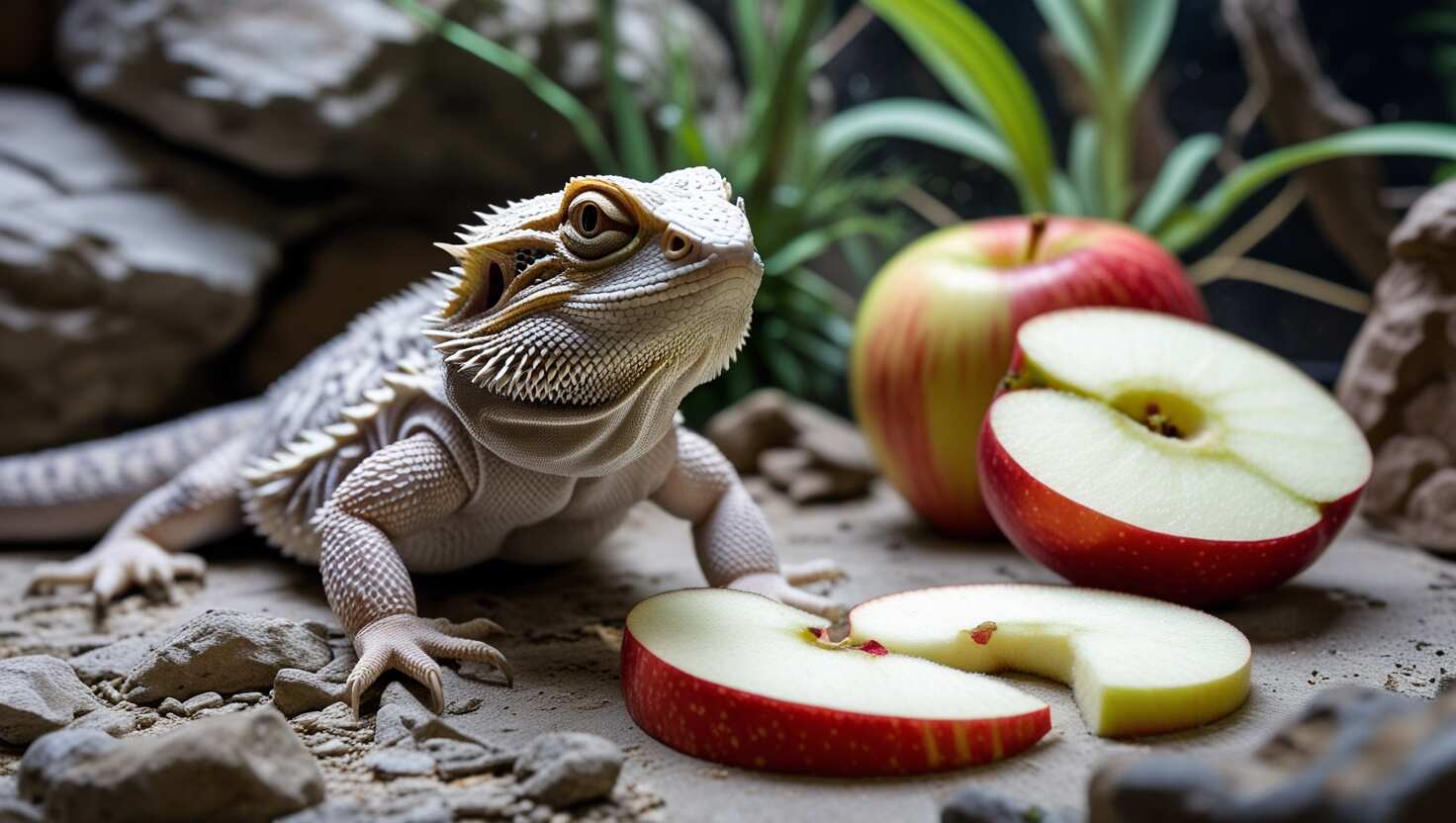Can bearded dragons eat apples?
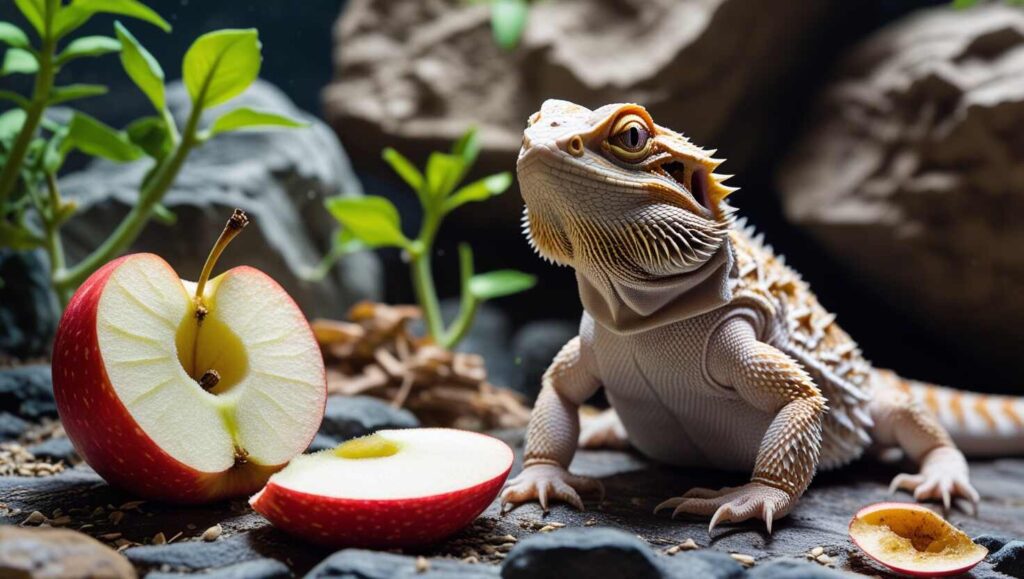
Bearded dragons can eat apples, but only as occasional treats due to their high sugar and poor calcium-phosphorus (C:P) ratio. Always remove the peel, seeds, and core to prevent choking hazards. Cut the apple into small, digestible pieces and monitor your dragon’s behavior. Feed apples once or twice a week for a balanced, safe diet.
Apples and Their Role in Bearded Dragon Diets
Apples, produced globally and enjoyed by millions, are a good, delicious fruit known for their essential nutritional value. Originating in Central Asia, they have spread across the world and are widely cultivated. You may hear the news say, “An apple a day keeps the doctor away,” emphasizing their health benefits for humans. But are apples safer for bearded dragons?
For beardies, apples can be part of their diet, but not on a regular basis. They should make up roughly 10% to 20% of the fruit and vegetable portion, along with other plants and insects. To keep your reptile healthy, ensure serving sizes are appropriate to minimize risks.
At Top Flight Dubia, our goal is to help resolve queries regarding beardie diets and provide news updates and guidance. Ensuring proper food balance is essential for the health and maintenance of these exotic reptile friends.
Apple Nutrition and Its Role for Bearded Dragons
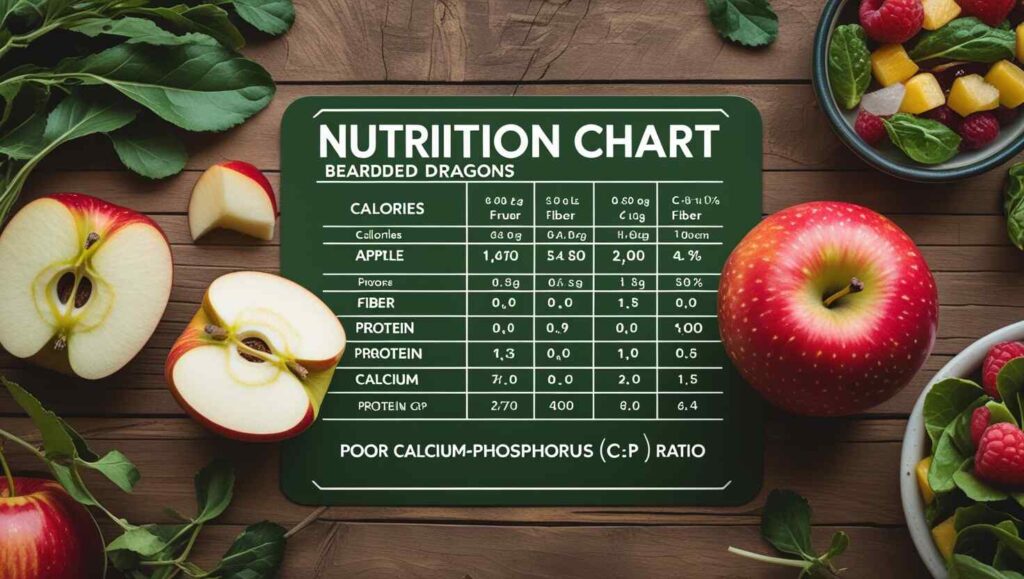
Nutritional Profile of Apples
- Calories: 52 per serving (with peel), 48 (without peel)
- Water content: 86.67g
- Carbohydrates: 14g (with peel), 12.76g (without peel)
- Sugars: 10.1g
- Fiber: 2.45g (peeled), 2.40g (with peel)
- Fat: 0.2g
- Protein: 0.3g
- Minerals:
- Calcium (Ca): 5mg
- Phosphorus (P): 11mg
- Potassium: 107mg
- Vitamins:
- Vitamin A: 38 IU
- Vitamin C: 4mg
- Vitamin K: 2.2mcg
- Ca:P Ratio: 0.5:1 (poor for calcium absorption)
Types of Apples and Differences
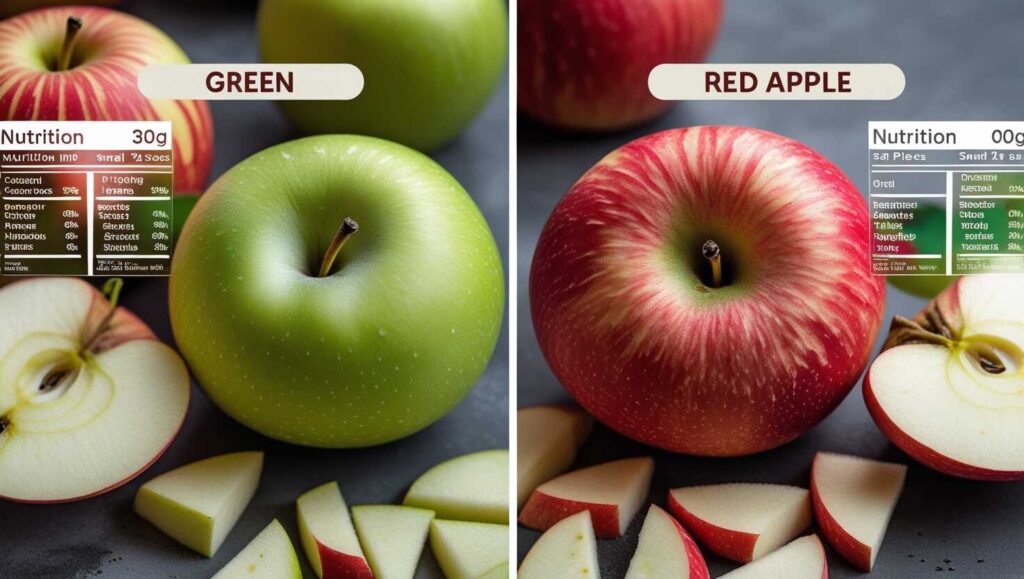
- Colors and taste vary between green and red apples.
- Green apples are typically less sweeter than red ones.
- Both types are healthy but contain varying sugar levels, which can affect your beardie’s digestion.
Feeding Instructions and Risks
- Remove the seeds, core, and peel to avoid choking hazards and harmful chemicals.
- Cut apples into small pieces for safer feeding.
- Feed as an occasional treat, once or twice per week.
- High natural sugar may lead to obesity, plaque, and digestive issues.
Bearded Dragon Dietary Adaptation
- Bearded dragons are omnivores from a desert environment, and their bodies are not designed for high-sugar foods.
- Their diets require a proper balance of foods rich in protein, fiber, and calcium to stay healthy.
- Since apples have a poor Ca:P ratio, extra calcium may be needed to prevent absorption issues.
General Feeding Notes
- The nutrition scores for apples rate them as a fair option for treats.
- Apples should never replace staple food blocks like plants, insects, and vegetables.
- Our guide helps answer questions and concerns to expand knowledge about feeding and maintaining bearded dragon health.
Benefits and Risks of Apples for Bearded Dragons
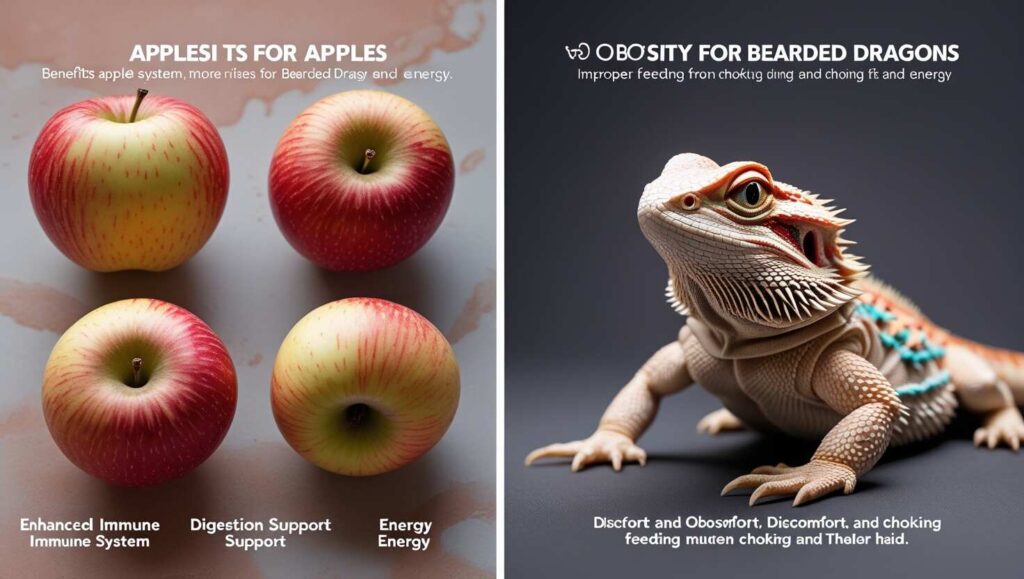
Benefits of Apples
- Apples are a nutrient-dense, healthy snack for your beardie.
- They pack a punch of nutrients, including vitamins A and C, which enhance:
- The immune system
- Vision, reproduction, and growth
- Fiber aids the digestive process, helping prevent constipation.
- Carbohydrates keep your dragon energized, while potassium helps regulate:
- Blood pressure
- Muscle function
- Kidney problems by reducing water retention
- Iron ensures oxygen travels smoothly in the body and keeps your dragon hydrated.
Risks of Apples
- Apples are roughly 80% water, but their high sugar content can lead to:
- Discomfort
- Tooth decay
- Obesity
- Fatty liver disease
- Diabetes, and potentially heart failure
- Overfeeding can cause harm and other health problems over time.
Feeding Guidelines
- Pro tip: Limit apples to once per week to maintain a balanced diet.
- Always feed apples in moderate doses, as limiting sugar is a key step to giving your friend a long life.
- Keeping apples intact with proper nutrient portions prevents issues while maintaining energy and muscle strength.
Feeding Guidelines and Precautions for Bearded Dragons
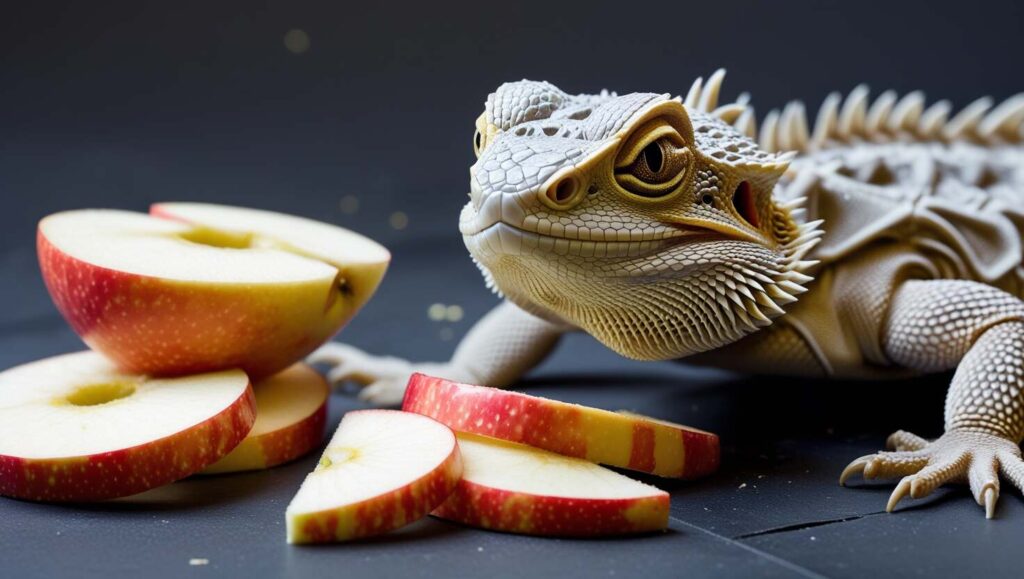
Watch Out for Seeds
- Always remove the seeds, stem, and core before feeding apples.
- Seeds are hard to digest and may cause gut impaction, a deadly condition where the digestive tract gets blocked, leading to possible death if left untreated.
Follow These Steps
- Peel the apple and slice it into small, thin pieces to prevent choking.
- Wash the apple thoroughly to remove chemicals and pesticides on its surface.
- Feeding organic apples is recommended to reduce the risk of harmful sprays and toxins.
Maintaining the Frequency
- Feed apples as an occasional treat, only once per week.
- Maintain a balanced diet by including other fruits, veggies, and green leafy vegetables like arugula.
Getting the Right Size
- Cut the apple into small, easy-to-chew pieces to prevent discomfort. Large pieces may cause trouble eating, such as coughing noises, struggling, or choking hazards.
Monitoring the Behavior
- During the first couple of times feeding apples, monitor your beardie closely.
- If your dragon shows signs of trouble swallowing or discomfort, adjust the size of the pieces.
- Apple peel can be tough to chew and hard to digest, creating risks of blockage and digestive issues. Always feed only the peeled apple flesh, which is softer and easier for your bearded dragon to handle safely.
Treats and Usage Tips
Bearded dragons can enjoy apples as treats when served correctly. Feed apples once or twice a week to your beardie as an occasional treat. Preparing an apple is similar to feeding a child a birthday cake—special and safe.
Start by cutting the entire apple into segments or thin slices, about the size of a large coin. Verify that the core, seeds, and stem are completely removed. Also, remove the skin as it can be difficult for dragons to eat. The pieces should be shorter and skinnier than the distance between your dragon’s eyes to prevent choking risks.
FAQs
Can Bearded Dragons Eat Apples?
Yes, bearded dragons can eat apples, but only as occasional treats. Apples have high sugar content and a poor calcium-phosphorus (C:P) ratio, which can cause health issues if consumed too frequently.
Can Bearded Dragons Eat Apple Skin?
No, apple skin should be removed. The peel is difficult to chew and can pose a choking hazard. Always remove the peel to ensure safe feeding.
What is the C:P Ratio in Apples?
The C:P ratio in apples is 0.5:1, making them unsuitable as a regular calcium source.
What are the Primary Preventative Measures One Takes Before and After Feeding Apples?
- Wash the apple thoroughly to remove chemicals and pesticides.
- Peel and cut the apple into small, digestible pieces.
- Observe your beardie’s behavior after feeding to catch any signs of discomfort. If symptoms worsen, consult a veterinarian.
What Fruits Can Bearded Dragons Eat?
Bearded dragons can eat other fruits like peaches, strawberries, mangoes, and blueberries, but these should be served in limited amounts within a regular balanced diet.
What Are the Significant Differences Between Green Apples and Red Apples?
There are no significant differences in nutritional value. Both green and red apples provide fiber, potassium, iron, and a small amount of protein. However, green apples tend to be less sweet than red apples.
How Much Can a Pet Owner Feed Apples to Bearded Dragons?
A responsible pet owner should maintain frequency by feeding apples once or twice a week. Only serve small pieces to ensure safe and easy digestion. Following these preventative measures will help keep your exotic dragon happy and healthy.
Kindly note: The content shared in this blog is gathered from online sources, some of which may not be verified. For accurate guidance on caring for your Bearded dragons, it is recommended to seek advice from a qualified veterinarian.

